Unit4 Staying be healthy 第1课时 基础知识及拓展 课件(共35张PPT)
文档属性
| 名称 | Unit4 Staying be healthy 第1课时 基础知识及拓展 课件(共35张PPT) |
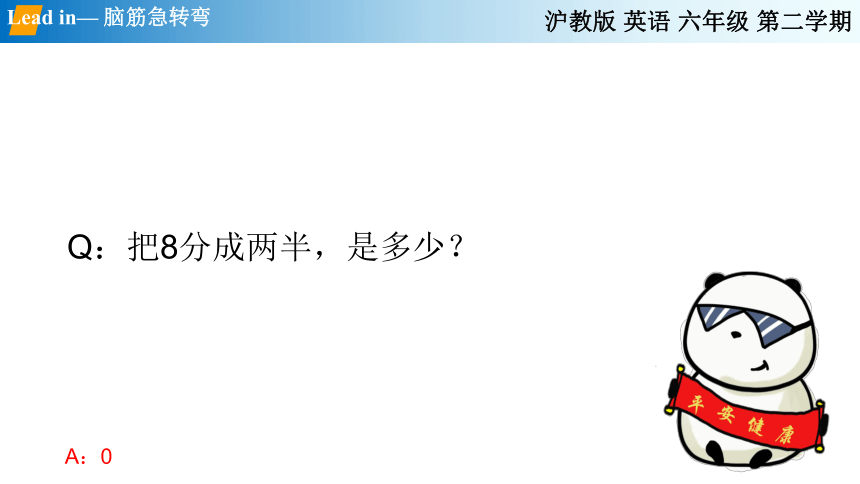
|
|
| 格式 | pptx | ||
| 文件大小 | 1.1MB | ||
| 资源类型 | 试卷 | ||
| 版本资源 | 牛津上海版(试用本) | ||
| 科目 | 英语 | ||
| 更新时间 | 2022-03-09 15:40:34 | ||
图片预览


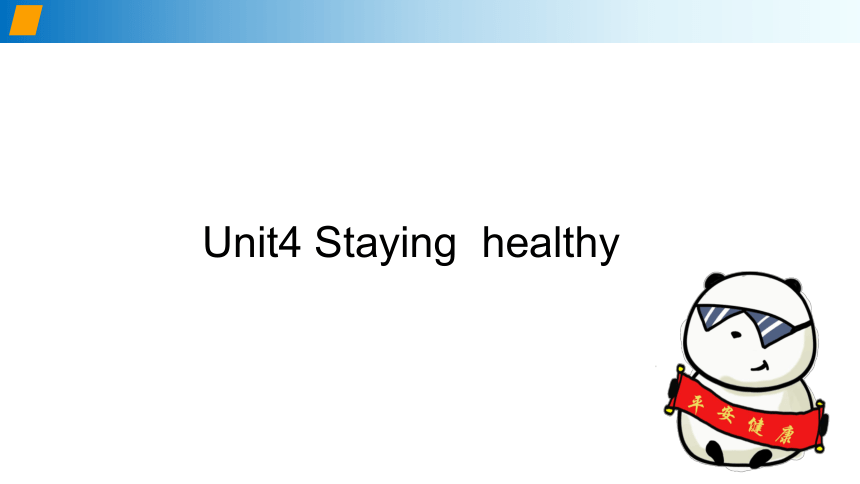


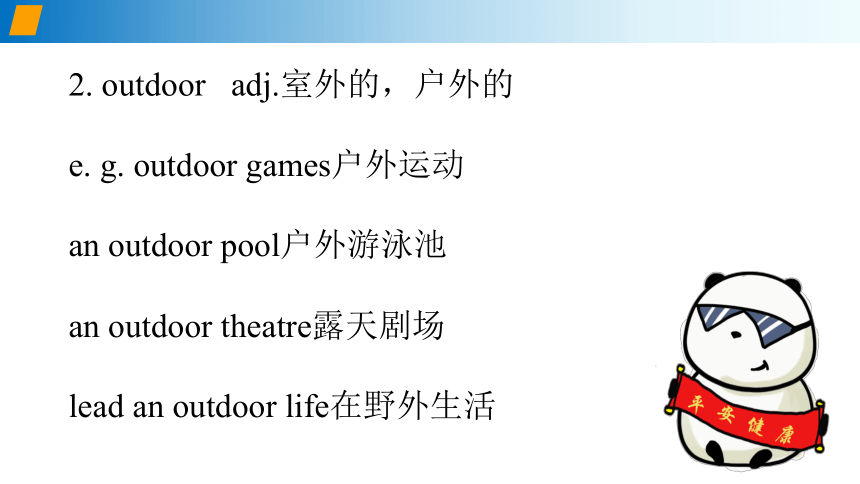

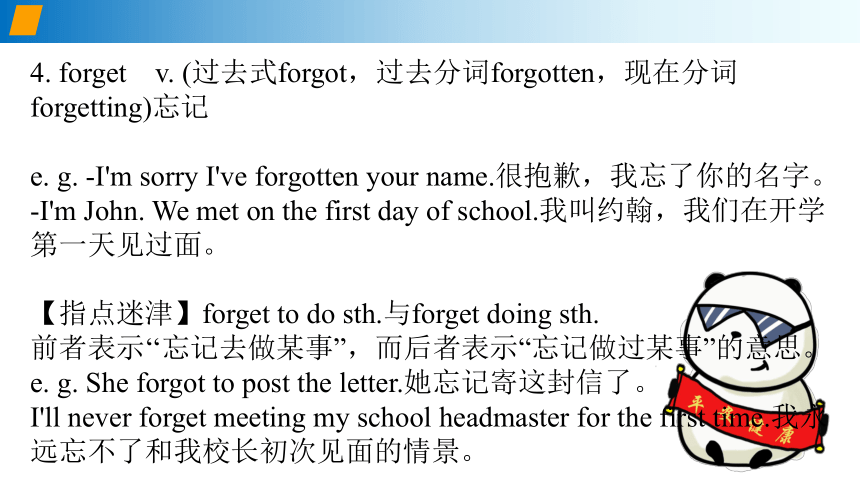
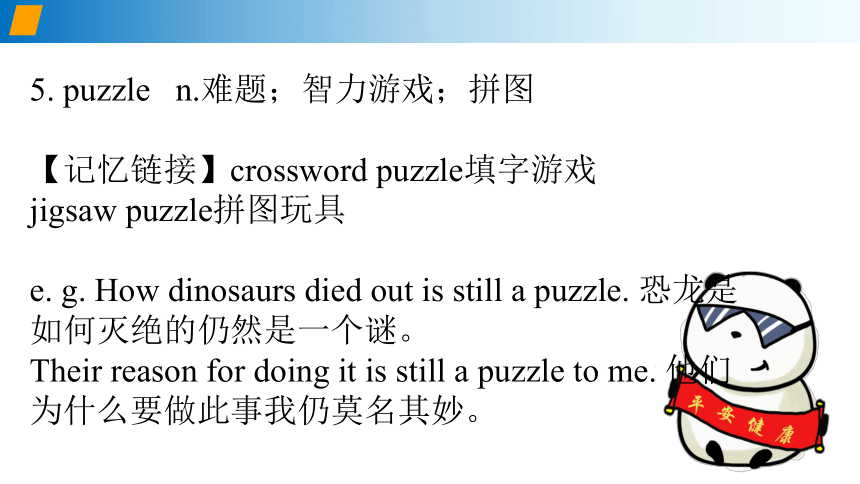
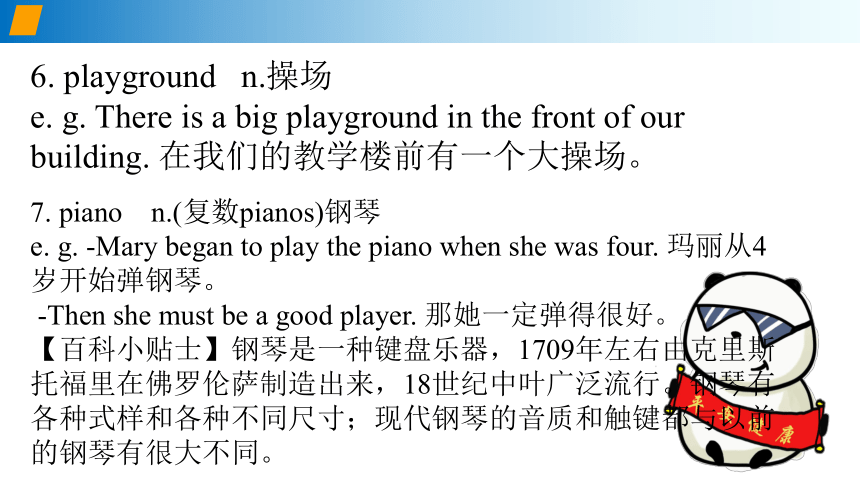

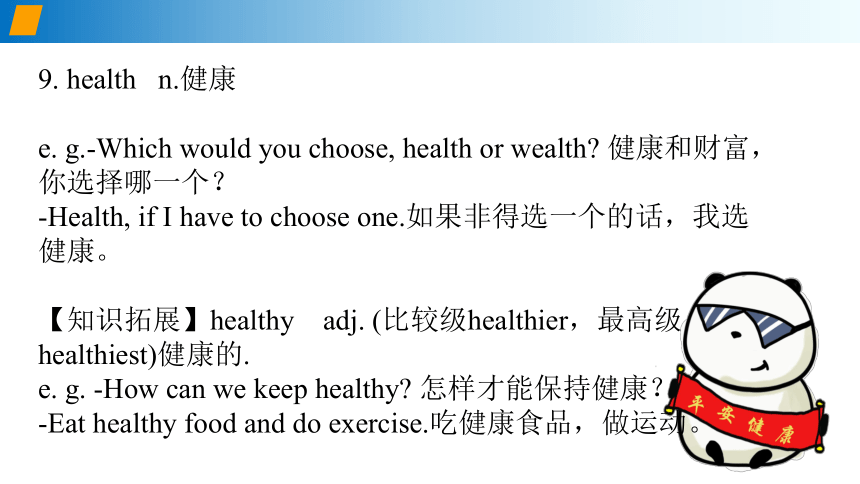
文档简介
(共35张PPT)
Lead in— 脑筋急转弯
Q:把8分成两半,是多少?
A:0
沪教版 英语 六年级 第二学期
Snow and Ice Knowledge 冰雪知识
Short Track Speed Skating
沪教版 英语 六年级 第二学期
Unit4 Staying healthy
一、新课导入
如何保持健康呢?
二、新课讲解
Ⅰ. words 单词
1. indoor adj.室内的,户内的
e. g. an indoor pool一个室内游泳池
indoor paint室内画
an indoor party户内聚会
indoor gardening户内园艺
2. outdoor adj.室外的,户外的
e. g. outdoor games户外运动
an outdoor pool户外游泳池
an outdoor theatre露天剧场
lead an outdoor life在野外生活
3. really adv.很,非常
e. g. -I've lost my money! 我丢了钱!
-Oh, that's really bad! 啊,那太槽糕了!
【知识拓展】really adv.(表示惊讶、怀疑、兴趣等)真的吗
e. g. -Mrs Lee's having a baby soon.李太太快要生孩子了。
-Really 真的吗?
4. forget v. (过去式forgot,过去分词forgotten,现在分词forgetting)忘记
e. g. -I'm sorry I've forgotten your name.很抱歉,我忘了你的名字。
-I'm John. We met on the first day of school.我叫约翰,我们在开学第一天见过面。
【指点迷津】forget to do sth.与forget doing sth.
前者表示‘‘忘记去做某事”,而后者表示“忘记做过某事”的意思。
e. g. She forgot to post the letter.她忘记寄这封信了。
I'll never forget meeting my school headmaster for the first time.我永远忘不了和我校长初次见面的情景。
5. puzzle n.难题;智力游戏;拼图
【记忆链接】crossword puzzle填字游戏
jigsaw puzzle拼图玩具
e. g. How dinosaurs died out is still a puzzle. 恐龙是如何灭绝的仍然是一个谜。
Their reason for doing it is still a puzzle to me. 他们为什么要做此事我仍莫名其妙。
6. playground n.操场
e. g. There is a big playground in the front of our building. 在我们的教学楼前有一个大操场。
7. piano n.(复数pianos)钢琴
e. g. -Mary began to play the piano when she was four. 玛丽从4岁开始弹钢琴。
-Then she must be a good player. 那她一定弹得很好。
【百科小贴士】钢琴是一种键盘乐器,1709年左右由克里斯托福里在佛罗伦萨制造出来,18世纪中叶广泛流行。钢琴有各种式样和各种不同尺寸;现代钢琴的音质和触键都与以前的钢琴有很大不同。
8. model n. 模型
e. g. -What are you doing 你在做什么?
-I'm building a model plane.我在做一架模型飞机。
【记忆链接】model ship 船模
9. health n.健康
e. g.-Which would you choose, health or wealth 健康和财富,你选择哪一个?
-Health, if I have to choose one.如果非得选一个的话,我选健康。
【知识拓展】healthy adj. (比较级healthier,最高级healthiest)健康的.
e. g. -How can we keep healthy 怎样才能保持健康?
-Eat healthy food and do exercise.吃健康食品,做运动。
10. problem v. 问题
e. g. -Do you have any problems at your new school 你在新学校有什么问题吗?
-Yes. I don't have many friends yet. 有,我的朋友还不多。
11. headache n.头痛
e. g. -Are you all right You look pale.你身体不舒服吗?你脸色苍白。
-I have a bad headache.我头疼得厉害。
【知识拓展】病痛的表达
(1)英语中身体各部位疼痛的词多数由“部位+ache”来表示。
(2)表示病痛的词大多数是可数名词,如a headache,a stomach ache等,但牙痛toothache是不可数名词。
12. cold n.感冒
a bad, heavy, slight cold严重、重、轻感冒
have a cold in the head/on the chest患伤风头疼/伤风咳嗽
e. g. -You look ill.你看上去好像病了。
-Yes, I've got a bad cold.是的,我得了重感冒。
【知识拓展】cold n.冷;寒冷
e. g. the heat of summer and the cold of winter夏暑冬寒
She doesn't seem to feel the cold.她似乎不觉得冷。
13. fever n.发热,发烧
e. g. -Tom has a fever.汤姆发烧了。
-Let's take him to hospital.咱们送他去医院吧。
Aspirin can reduce fever.阿司匹林可以退烧。
14. sore adj.疼痛的
e. g. -Jim, you sound strange today. 吉姆,你的声音今天听起来有点儿奇怪。
-I've caught a cold and have a sore throat. 我感冒了,嗓子疼。
My leg is still very sore.我的腿还是很疼。
She's still a bit sore after the accident.她出事后直到现在还觉得痛呢。
15. throat n.喉咙
【常用搭配】clear one's throat清清喉咙
at the top of one's throat(尽量)放大嗓子
e. g. A fish bone has stuck in my throat.一根鱼刺卡在我嗓子里了。
16. once adv. 一次;一回
e. g. I go to see a film once a week.我每周看一场电影。
【记忆链接】
(1) at once马上,立刻;同时
e. g. Do it at once.马上做。
Don't all speak at once! 大家别一块儿说话!
(2) once (and) for all最后一次
e. g. Once and for all, we can't agree! 最后再说一遍,我们不能同意!
(3) once or twice几次;一两次
17. practise v.实践;练习
e. g. If you want to play a musical instrument well, you must practise every day.如果你想奏乐器奏得好,必须天天练习。
【友情提示】在美语中,practise又可拼写为practice,与名词形式同形。
【知识拓展】practice n.实践,实行;练习
e. g. -The idea would never work in practice.那种设想永远也实现不了。
-Playing the piano well requires a lot of practice.要弹好钢琴就得多练习。
18. housework n.家务劳动
e. g. I usually help my mother do the housework.我常常帮助我妈妈做家务劳动。
Daily expressions. 日常表达
1. like/love/enjoy doing… 喜欢做…
e. g. Many children like/love/enjoy flying kites on a fine day.许多孩子喜欢在晴天放风筝。
2. have a headache 头痛
“身体部位+ache”表示病痛。此处have意为“患病,得病”。
e. g. have a stomach ache胃痛 have toothache牙痛
【知识拓展】其他对于身体不适的表达还有:
have a cold感冒 have a fever发烧
3. practise swimming练习游泳
practise doing sth.表示“练习做……”“训练……”的意思。
e.g. She practises playing the violin every morning. 她每天早上都练习拉小提琴。
4. help do the housework帮忙做家务
help(to) do sth. 表示“帮忙做……”,有时可以改写为help with sth。
e. g. Sally often helps her mum do the housework.
=Sally often helps her mum with the housework.莎莉经常帮妈妈做家务。
Ⅰ. Choose the right word In the brackets to complete the sentence.
1. I always . (have sore throat / have a sore throat).
2. I'd like to (buy/sell) some biscuits for my son.
3. (Swim /Swimming) is a kind of activity.
4. He has (fewer/less) sheep than you, doesn't he
5. (Both / Neither) of my parents are teacher.
【随堂小练】
【Keys】1. have a sore throat 2. buy 3. Swimming 4. fewer 5. Both
Important Sentences structures
1. Work and play, we love both.
both pron. 意为“两者(都)……”,在本句中指的是学习和工作这两件事。
e. g. Both of the twins like doing puzzles.这对双胞胎都喜欢猜谜。
2. How often do you exercise
exercise n.&v.锻炼,运动
e. g. Take more exercise to stay healthy.多做运动,以保持健康。(作名词)
You're getting fat, so you should exercise more.你长胖了,所以要多运动。(作动词)
【友情提示】exercise作“运动”解释时是不可数名词,作“体操”和“练习”解释时是可数名词。
【记忆链接】gymnastic exercises体操,健身操;[军]操练 morning exercise早操 spelling exercises拼写练习
exercise book笔记本 do one's exercises(=do one's homework)做功课
take exercise做体操,做健身活动 oral exercise口头练习 physical exercise体育运动;身体操练
3. -What should I do
-You should watch less television.
(1) should表示劝告、建议、命令等,意为“应该”。
e. g. You should wash your hands first.
=You ought to wash your hands first.你应该先洗手。
We should learn how to use computers.我们应该学怎样使用电脑。
(2) less为little的比较级,通常与不可数名词连用。
e. g. We have less snow this year than usual.今年的雪比往年少。
Less noise please.请不要大声吵闹。
【注意】less的反义词为more。
4. It's because you don't have enough exercise, I'm afraid.
(1) because为连词,引导原因状语从句。
e. g. We didn't go to the park because it rained hard.因为雨下得很大,我们没去公园。
(2) enough在这为形容词,意为“足够的”,修饰不可数名词exercise。
【知识拓展】
(1) enough为副词时,修饰形容词、动词或其他副词,意为“足够地;十分”,只可以放在所修饰词之后。
e. g. The book is easy enough for you to read.这本书对你来说很容易看懂。
(2) enough还可作名词,意为“够;足够;充足”,既可作可数名词,也可作不可数名词,作主语时可根据具体情况来
定谓语动词的数。
e. g. Enough is as good as a feast.(谚)知足常乐。
5. He enjoys running.
enjoy意为“享受……的乐趣;喜欢”。其同义词为like,其后常接名词、代词、动词-ing形式。
e. g. Do you enjoy living in the country 你喜欢居住在乡下吗?
I enjoy playing tennis.我喜欢打网球。
Did you enjoy the movie 你喜欢那部电影吗?
【知识拓展】enjoy oneself相当于have a good time意为“过得愉快”。
e. g. I hope you enjoy yourselves.我希望你们玩得开心。
( ) 1. It's to sing together at the birthday party.
A. a great fun B. a great funny
C. great fun D. great funny
( ) 2. I love outdoor in spring and autumn.
A. activity B. action C. activityes D. activities
( ) 3. Tina usually plays after school.
A. the piano B. the piano
C. a piano D. a piano
( ) 4. I always have a headache because I watch too television.
A. much B. many C. a lot of D. plenty of
( ) 5. Tim had a fever yesterday because he didn't wear_______.
A. enough cloth B. enough clothes
C. cloth enough D. clothes enough
【随堂小练】
1. C 2. D 3. B 4. A 5. B
愿君皆有所获,皆有所得
Lead in— 脑筋急转弯
Q:把8分成两半,是多少?
A:0
沪教版 英语 六年级 第二学期
Snow and Ice Knowledge 冰雪知识
Short Track Speed Skating
沪教版 英语 六年级 第二学期
Unit4 Staying healthy
一、新课导入
如何保持健康呢?
二、新课讲解
Ⅰ. words 单词
1. indoor adj.室内的,户内的
e. g. an indoor pool一个室内游泳池
indoor paint室内画
an indoor party户内聚会
indoor gardening户内园艺
2. outdoor adj.室外的,户外的
e. g. outdoor games户外运动
an outdoor pool户外游泳池
an outdoor theatre露天剧场
lead an outdoor life在野外生活
3. really adv.很,非常
e. g. -I've lost my money! 我丢了钱!
-Oh, that's really bad! 啊,那太槽糕了!
【知识拓展】really adv.(表示惊讶、怀疑、兴趣等)真的吗
e. g. -Mrs Lee's having a baby soon.李太太快要生孩子了。
-Really 真的吗?
4. forget v. (过去式forgot,过去分词forgotten,现在分词forgetting)忘记
e. g. -I'm sorry I've forgotten your name.很抱歉,我忘了你的名字。
-I'm John. We met on the first day of school.我叫约翰,我们在开学第一天见过面。
【指点迷津】forget to do sth.与forget doing sth.
前者表示‘‘忘记去做某事”,而后者表示“忘记做过某事”的意思。
e. g. She forgot to post the letter.她忘记寄这封信了。
I'll never forget meeting my school headmaster for the first time.我永远忘不了和我校长初次见面的情景。
5. puzzle n.难题;智力游戏;拼图
【记忆链接】crossword puzzle填字游戏
jigsaw puzzle拼图玩具
e. g. How dinosaurs died out is still a puzzle. 恐龙是如何灭绝的仍然是一个谜。
Their reason for doing it is still a puzzle to me. 他们为什么要做此事我仍莫名其妙。
6. playground n.操场
e. g. There is a big playground in the front of our building. 在我们的教学楼前有一个大操场。
7. piano n.(复数pianos)钢琴
e. g. -Mary began to play the piano when she was four. 玛丽从4岁开始弹钢琴。
-Then she must be a good player. 那她一定弹得很好。
【百科小贴士】钢琴是一种键盘乐器,1709年左右由克里斯托福里在佛罗伦萨制造出来,18世纪中叶广泛流行。钢琴有各种式样和各种不同尺寸;现代钢琴的音质和触键都与以前的钢琴有很大不同。
8. model n. 模型
e. g. -What are you doing 你在做什么?
-I'm building a model plane.我在做一架模型飞机。
【记忆链接】model ship 船模
9. health n.健康
e. g.-Which would you choose, health or wealth 健康和财富,你选择哪一个?
-Health, if I have to choose one.如果非得选一个的话,我选健康。
【知识拓展】healthy adj. (比较级healthier,最高级healthiest)健康的.
e. g. -How can we keep healthy 怎样才能保持健康?
-Eat healthy food and do exercise.吃健康食品,做运动。
10. problem v. 问题
e. g. -Do you have any problems at your new school 你在新学校有什么问题吗?
-Yes. I don't have many friends yet. 有,我的朋友还不多。
11. headache n.头痛
e. g. -Are you all right You look pale.你身体不舒服吗?你脸色苍白。
-I have a bad headache.我头疼得厉害。
【知识拓展】病痛的表达
(1)英语中身体各部位疼痛的词多数由“部位+ache”来表示。
(2)表示病痛的词大多数是可数名词,如a headache,a stomach ache等,但牙痛toothache是不可数名词。
12. cold n.感冒
a bad, heavy, slight cold严重、重、轻感冒
have a cold in the head/on the chest患伤风头疼/伤风咳嗽
e. g. -You look ill.你看上去好像病了。
-Yes, I've got a bad cold.是的,我得了重感冒。
【知识拓展】cold n.冷;寒冷
e. g. the heat of summer and the cold of winter夏暑冬寒
She doesn't seem to feel the cold.她似乎不觉得冷。
13. fever n.发热,发烧
e. g. -Tom has a fever.汤姆发烧了。
-Let's take him to hospital.咱们送他去医院吧。
Aspirin can reduce fever.阿司匹林可以退烧。
14. sore adj.疼痛的
e. g. -Jim, you sound strange today. 吉姆,你的声音今天听起来有点儿奇怪。
-I've caught a cold and have a sore throat. 我感冒了,嗓子疼。
My leg is still very sore.我的腿还是很疼。
She's still a bit sore after the accident.她出事后直到现在还觉得痛呢。
15. throat n.喉咙
【常用搭配】clear one's throat清清喉咙
at the top of one's throat(尽量)放大嗓子
e. g. A fish bone has stuck in my throat.一根鱼刺卡在我嗓子里了。
16. once adv. 一次;一回
e. g. I go to see a film once a week.我每周看一场电影。
【记忆链接】
(1) at once马上,立刻;同时
e. g. Do it at once.马上做。
Don't all speak at once! 大家别一块儿说话!
(2) once (and) for all最后一次
e. g. Once and for all, we can't agree! 最后再说一遍,我们不能同意!
(3) once or twice几次;一两次
17. practise v.实践;练习
e. g. If you want to play a musical instrument well, you must practise every day.如果你想奏乐器奏得好,必须天天练习。
【友情提示】在美语中,practise又可拼写为practice,与名词形式同形。
【知识拓展】practice n.实践,实行;练习
e. g. -The idea would never work in practice.那种设想永远也实现不了。
-Playing the piano well requires a lot of practice.要弹好钢琴就得多练习。
18. housework n.家务劳动
e. g. I usually help my mother do the housework.我常常帮助我妈妈做家务劳动。
Daily expressions. 日常表达
1. like/love/enjoy doing… 喜欢做…
e. g. Many children like/love/enjoy flying kites on a fine day.许多孩子喜欢在晴天放风筝。
2. have a headache 头痛
“身体部位+ache”表示病痛。此处have意为“患病,得病”。
e. g. have a stomach ache胃痛 have toothache牙痛
【知识拓展】其他对于身体不适的表达还有:
have a cold感冒 have a fever发烧
3. practise swimming练习游泳
practise doing sth.表示“练习做……”“训练……”的意思。
e.g. She practises playing the violin every morning. 她每天早上都练习拉小提琴。
4. help do the housework帮忙做家务
help(to) do sth. 表示“帮忙做……”,有时可以改写为help with sth。
e. g. Sally often helps her mum do the housework.
=Sally often helps her mum with the housework.莎莉经常帮妈妈做家务。
Ⅰ. Choose the right word In the brackets to complete the sentence.
1. I always . (have sore throat / have a sore throat).
2. I'd like to (buy/sell) some biscuits for my son.
3. (Swim /Swimming) is a kind of activity.
4. He has (fewer/less) sheep than you, doesn't he
5. (Both / Neither) of my parents are teacher.
【随堂小练】
【Keys】1. have a sore throat 2. buy 3. Swimming 4. fewer 5. Both
Important Sentences structures
1. Work and play, we love both.
both pron. 意为“两者(都)……”,在本句中指的是学习和工作这两件事。
e. g. Both of the twins like doing puzzles.这对双胞胎都喜欢猜谜。
2. How often do you exercise
exercise n.&v.锻炼,运动
e. g. Take more exercise to stay healthy.多做运动,以保持健康。(作名词)
You're getting fat, so you should exercise more.你长胖了,所以要多运动。(作动词)
【友情提示】exercise作“运动”解释时是不可数名词,作“体操”和“练习”解释时是可数名词。
【记忆链接】gymnastic exercises体操,健身操;[军]操练 morning exercise早操 spelling exercises拼写练习
exercise book笔记本 do one's exercises(=do one's homework)做功课
take exercise做体操,做健身活动 oral exercise口头练习 physical exercise体育运动;身体操练
3. -What should I do
-You should watch less television.
(1) should表示劝告、建议、命令等,意为“应该”。
e. g. You should wash your hands first.
=You ought to wash your hands first.你应该先洗手。
We should learn how to use computers.我们应该学怎样使用电脑。
(2) less为little的比较级,通常与不可数名词连用。
e. g. We have less snow this year than usual.今年的雪比往年少。
Less noise please.请不要大声吵闹。
【注意】less的反义词为more。
4. It's because you don't have enough exercise, I'm afraid.
(1) because为连词,引导原因状语从句。
e. g. We didn't go to the park because it rained hard.因为雨下得很大,我们没去公园。
(2) enough在这为形容词,意为“足够的”,修饰不可数名词exercise。
【知识拓展】
(1) enough为副词时,修饰形容词、动词或其他副词,意为“足够地;十分”,只可以放在所修饰词之后。
e. g. The book is easy enough for you to read.这本书对你来说很容易看懂。
(2) enough还可作名词,意为“够;足够;充足”,既可作可数名词,也可作不可数名词,作主语时可根据具体情况来
定谓语动词的数。
e. g. Enough is as good as a feast.(谚)知足常乐。
5. He enjoys running.
enjoy意为“享受……的乐趣;喜欢”。其同义词为like,其后常接名词、代词、动词-ing形式。
e. g. Do you enjoy living in the country 你喜欢居住在乡下吗?
I enjoy playing tennis.我喜欢打网球。
Did you enjoy the movie 你喜欢那部电影吗?
【知识拓展】enjoy oneself相当于have a good time意为“过得愉快”。
e. g. I hope you enjoy yourselves.我希望你们玩得开心。
( ) 1. It's to sing together at the birthday party.
A. a great fun B. a great funny
C. great fun D. great funny
( ) 2. I love outdoor in spring and autumn.
A. activity B. action C. activityes D. activities
( ) 3. Tina usually plays after school.
A. the piano B. the piano
C. a piano D. a piano
( ) 4. I always have a headache because I watch too television.
A. much B. many C. a lot of D. plenty of
( ) 5. Tim had a fever yesterday because he didn't wear_______.
A. enough cloth B. enough clothes
C. cloth enough D. clothes enough
【随堂小练】
1. C 2. D 3. B 4. A 5. B
愿君皆有所获,皆有所得
同课章节目录
- Module 1 City life
- Unit 1 Great cities in Asia
- Unit 2 At the airport
- Unit 3 Dragon Boat Festival
- Unit 4 Staying healthy
- Module 2 Changes
- Unit 5 What will I be like?
- Unit 6 Seasonal changes
- Unit 7 Travelling in Garden City
- Module 3 The nature world
- Unit 8 Windy weathe
- Unit 9 Sea water and rain wate
- Unit 10 Forests and land
- Unit 11 Controlling fire
